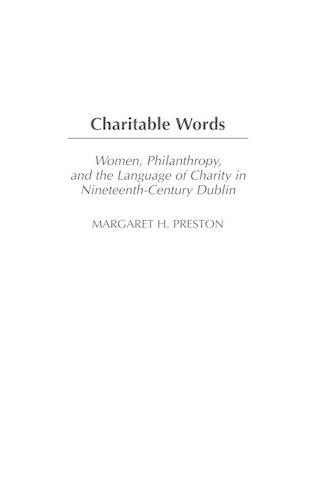
Charitable Words: Women, Philanthropy, and the Language of Charity in Nineteenth-Century Dublin
(Hardback)
Publishing Details
Charitable Words: Women, Philanthropy, and the Language of Charity in Nineteenth-Century Dublin
By (Author) Margaret Preston
Bloomsbury Publishing PLC
Praeger Publishers Inc
30th October 2004
United States
Classifications
Professional and Scholarly
Non Fiction
361.70820941835
Physical Properties
Hardback
226
Description
Mismanaged by local authority, in the 19th-century, Dublin lacked sufficient industrial development to provide adequate employment. Dublin's charitable workers attempted to improve the lives of the thousands who flocked to the city in search of relief. As a means to examining the hidden incentives of charity, the author offers a discussion of the language of charity in this setting. She notes how contemporary notions of race, class, and religion influenced how Ireland's philanthropists thought of and related to the poor. While much has been written on the perceived racial inferiority of the Celt as compared to the Anglo-Saxon, Preston suggests that the Irish upper classes, in seeking to gain equal footing with the British elite, adopted the same language to describe the poor. Intense sectarian strife marred Irish charities and undermined the smooth operation of social services. Preston offers insight by focusing on two women philanthropists who battled for the souls of Ireland's children. She also explores those who remained above the fray, such as the Religious Society of Friends in Ireland, who offered aid to all regardless of creed. Within the charitable records of this group, Preston contends that one can see how the Society changed over time and that, in Ireland, the industrial revolution as well as the 1798 Rebellion, contributed to the Society adapting to the mainstream. Finally, the women of charity helped to establish a modern nursing system for Ireland, and this work details their efforts at turning nursing into a respectable profession for women.
Reviews
"[T]he book has value in revealing material previously not explored, particularly so as Dublin adds the question of sectarianism to the development of an infrastructure of charities essential in a period of underemployment, great poverty, and lack of government initiatives."-American Historical Review
"[A] most valuable addition to the literature on Dublin charities, on women and philanthropy, on nursing, and on language. The bibliography is an excellent resource in its own right, and the thorough footnoting will actively assist researchers enquiring further into any of the many intriguing avenues opened up....[t]he book is carefully produced, and must be commended as a model of thoughtful scholarship."-Irish Economic and Social History
[A] most valuable addition to the literature on Dublin charities, on women and philanthropy, on nursing, and on language. The bibliography is an excellent resource in its own right, and the thorough footnoting will actively assist researchers enquiring further into any of the many intriguing avenues opened up....[t]he book is carefully produced, and must be commended as a model of thoughtful scholarship.-Irish Economic and Social History
[T]he book has value in revealing material previously not explored, particularly so as Dublin adds the question of sectarianism to the development of an infrastructure of charities essential in a period of underemployment, great poverty, and lack of government initiatives.-New Hibernia Review
"A most valuable addition to the literature on Dublin charities, on women and philanthropy, on nursing, and on language. The bibliography is an excellent resource in its own right, and the thorough footnoting will actively assist researchers enquiring further into any of the many intriguing avenues opened up....the book is carefully produced, and must be commended as a model of thoughtful scholarship."-Irish Economic and Social History
"The book has value in revealing material previously not explored, particularly so as Dublin adds the question of sectarianism to the development of an infrastructure of charities essential in a period of underemployment, great poverty, and lack of government initiatives."-New Hibernia Review
"This study is carefully written and impressively researched, and Preston makes particularly good use of the pamphlet literature....Charitable Words is a fine first book, which adds to both our knowledge of Irish women's history and the history of philanthropy."-New Hibernia Review
Author Bio
MARGARET H. PRESTON is Assistant Professor of History at Augustana College in Sioux Falls, South Dakota. She is a social and economic historian who also focuses on issues of gender in modern Ireland, Britain, and India.
